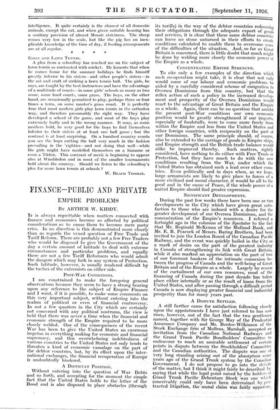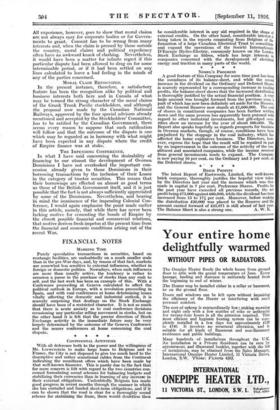FINANCE-PUBLIC AND PRIVATE IT is always regrettable when matters connected
with finance and economics become so affected by political considerations as to cause them to become mere party cries. In no direction is this demonstrated more clearly than as regards the vexed question of Free Trade and Tariff Reform. There are probably not a few Free Traders who would be disposed to give the Government of the day a certain amount of latitude to deal with extreme circumstances and particular problems, and equally there are not a few Tariff Reformers who would admit the dangers which may lurk in any system of Protection. Such latitude, however, is usually rendered difficult by the tactics of the extremists on either side.
POST-WAR CONDITIONS.
I am constrained to make the foregoing general observations because they seem to have a strong bearing upon any reference to the subject of Empire Finance and I want, if it is possible, to make some comments on this very important subject, without entering into the realms of political or even of financial controversy. In not a few quarters in the City which are certainly not concerned with any political nostrums, the view is held that there was never a time when the financial and economic strength of the Empire required to be more closely welded. One of the consequences of the recent War has been to give the United States an enormous impetus in everything making for economic and financial supremacy, and this overwhelming indebtedness of various countries to the United States not only tends to threaten a kind of economic vassalage on the part of the debtor countries, but, by its effect upon the inter- national exchanges, the financial recuperation of EuroPe is undoubtedly hindered.
A DIFFICULT POSITION.
. Without entering into the question of War Debti and so forth, and accepting for the moment the simple fact that the United States holds to the letter of the Bond and is also disposed to place obstacles (through its tariffs) in the way of the debtor countries redeeming their obligations through the adequate export of goods and services, it is clear that these same debtor countries can leave no stone unturned in their efforts to create conditions calculated to enable them to overcome some of the difficulties of the situation. And, so far as Great Britain is concerned, there is little doubt that much might be done by welding more closely the economic power of the Empire as a whole.
CONCENTRATING EMPIRE STRENGTH.
To cite only a few examples of the direction which such co-operation might take, it is clear that not only would some of our labour and economic problems be aided by a carefully considered scheme of emigration to Oversea Dominions from this country, but that the reflex action of such a policy in the increased develop- ment and prosperity of the Oversea Dominions would react to the advantage of Great Britain and the Empire as a whole. Again, there can be no question that amidst the present post-War conditions our own economic position would be greatly strengthened if our imports, especially of foodstuffs, were to come more freely from within the Empire and less from the United States and other foreign countries, with reciprocity on the part 01 our Dominions. The same principle should, of course, also be extended to the carriage of goods in Empire ships, and Empire strength and the British trade balance would alike be improved thereby. Such matters, rightly considered, have nothing to do either with Free Trade or Protection, but they have much to do with the new conditions resulting from the War, under which the United States has obtained such a lead over other coun- tries. Even politically and in days when, as we hope, large armaments are likely to give place to forces of a more civilized and moral character, it would be all to the good and in the cause of Peace, if the whole power of a united Empire should find greater expression.
SIGNIFICANT DEVELOPMENTS.
During the past few weeks there have been one or two developments in the City which have given great satis- faction to those who are imbued with a desire for the greater development of our Oversea Dominions, and the concentration of the Empire's resources...I referred a fortnight ago in the columns of the Spectator to the fact that Mr. Reginald McKenna of the Midland Bank, and Mr. E. R. Peacock of -Messrs. Baring Brothers, had been invited to join the London Board of the Canadian Pacific Railway, and the event was quickly hailed in the City as a mark of desire on the part of the greatest industry in Canada of strengthening its link' with Great Britain, while it also marked an appreciation on the part of two of our foremost bankers of the intimate connexion be- tween the progress of Canada and the well-being of Great Britain and of the Empire as a whole. Largely by reason of the curtailment of our own resources, most of the financing of Canada during the past decade has taken place either internally or as the result of loans from the United States; and after passing through a difficult period Canada is now displaying greater financial and industrial prosperity than for many years past.
A DISPUTE SETTLED.
A still further cause for satisfaction following closely upon the appointments I have just referred to has now risen, however, out of the fact that the two gentlemen named, together with Sir George May of the Prudential Assurance Company and Mr. Berdoe-Wilkinson of the Stock Exchange firm of Mullens, Marshall, accepted an invitation from the. Canadian National Railways and the Grand Trunk Pacific Bondholders' Committee to endeavour to reach an amicable settlement of certain points in dispute between the Stockholders' Committee and the Canadian authorities. The dispute was one of very long standing arising out of the absorption some years ago of the Grand Trunk system by the Canadian Government. I do not propose to go into the details• of the matter, bnt I think' it might fairly be described saying that while the legal point raised by the holders oi Grand Trunk Pacific Debenture Stock was one Which. conceivably could only . have been determined_ by pro- tracted litigation, thei moral chlim" was fairly-apparent.. All experience, however, goes to show that moral claims are, not always easy for corporate bodies or for Govern- nients to grant. Consent has to. be .wrung from. many interests and, when the claim is pressed by those outside the country, moral claims and political expediency often have an awkward knack of clashing. Nevertheless, it would have been a matter for infinite regret if this particular dispute had been allowed to drag on for some 'interminable period, or if it had been settled on any lines calculated to leave a bad feeling in the minds of any of the parties concerned.
MORAL CLAIM RECOGNIZED.
In the present instance, therefore, a satisfactory feature has been the recognition alike by political and .business interests both here and in Canada of what may be termed the strong character of the moral claims of the Grank Trunk Pacific stockholders, and although the proposal now made by the Canadian National Railways, approved by the four special advisors already 'mentioned and accepted by the Stockholders' Committee, has to be ratified by the Canadian Government, there :seems every reason to suppose that such ratification will follow and that the outcome of the dispute is one 'which may be regarded as in harmony with what might have been expected in any dispute where the credit of Empire finance was at stake.
THE IMPENDING CONFERENCE.
In what I have said concerning the desirability of .financing to our utmost the development of Oversea Dominions I have not overlooked the important con- cession already given to those Dominions in their borrowing transactions by the inclusion of their Loans in the category of trustee securities. This means that their borrowings are effected on almost as good terms 'as those of the British Government itself, and it is just possible that the fact is not always sufficiently appreciated by some of the Dominions. Nevertheless, and bearing in mind the imminence of the impending Colonial Con- ference, I would again emphasize the point made earlier in this article, namely, that while there has never been lacking motive for cementing the bonds of Empire by the closest possible financial and commercial relations, that motive derives fresh impetus at the present time from the financial and economic conditions arising out of the recent War.







































 Previous page
Previous page